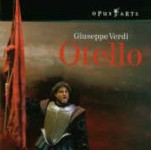The curtain rises and we see practically nothing–minimalism at its most minimalist. With direction by Willy Decker, sets and costumes by John Macfarlane, and lighting by David Finn, this Otello is a masterpiece of internalization. The severely raked playing space narrows as it reaches the back of the stage, where it occasionally opens to reveal the sky–star-filled, or cloudy and treacherous looking. There is a 12-or-so-foot omnipresent wooden cross and a skewed half mirror, stage rear, for the scene in which Otello attacks Desdemona (the first scene of Act 3). Otherwise, no props, no furniture.
The opera is performed in two parts, with the break coming after the second act, and there is no pause in the action at all between Acts 1 and 2–or 3 and 4. The cross is broken by Otello for the Oath scene and Desdemona uses it as her deathbed in the last scene. The only times the narrow playing area gets in the way is in the first act’s celebrations and the scene with the Venetian ambassador–chorus and dancers could use some more room. But the first scene in particular is incidental to Otello’s character; the effect gives the opera the feeling of claustrophobia–and no escape–that is clearly Otello’s mind. And Willy Decker has his characters moving naturally and often–this is anything but a stand-and-deliver performance. The Cassio/Rodrigo duel is action-packed and takes up the entire playing area; Otello’s stalking of Desdemona is frightening. Torment reigns supreme.
If you’re over 30 it is probably impossible to see this opera without comparing the singer in the title role with Placido Domingo or Jon Vickers. José Cura remains a somewhat frustrating singer–he strains, sings at half voice more often than he ought to (he seems to be saving his voice rather than obeying dynamic markings), and occasionally makes truly unappealing sounds. But when he opts for sheer power or emotional truth, he is breathtaking–more Vickers than Domingo in his raw brutality and equally raw fragility. I can honestly say that before seeing this performance I had never been even remotely moved by a performance of Cura’s, either live or recorded, but this is a deeply thought-out, thrilling performance you won’t soon forget.
At his side are the Iago of Lado Atanelli and the Desdemona of Krassimira Stoyanova. Atanelli is a smooth actor and therefore a dangerous Iago. His voice is a good size and has true bite to it; his Credo is grand and his sly insinuations cruel. The Oath Duet is terrifying in its intensity. Stoyanova, an unusual dark-haired Desdemona (most directors make her blond for the contrast), has a full, rich sound and she has no fear of letting it out. Her acting is dignified and focused and she moves with grace. Decker’s decision to have her on stage from the opening moments of the opera is a mistake; her appearance after the duel and fracas is, as Verdi realized, far more effectual. She delivers a lovely, nervous Willow Song but the Ave Maria disappoints somewhat–an odd flutter enters her voice at piano and it sounds unfinished. Still, there’s little to complain about.
A fine young, handsome tenor named Vittorio Grigolo sings and acts Cassio with clear tone and dramatic purpose; Ketevan Kemoklidze’s Emilia is young and helpful and she holds up her end of the ensembles handsomely. The same might be said of the Rodrigo, Lodovico, and Montano.
Conductor Antoni Ros-Marbà at first seems to be on the verge of losing control of the pit/stage relationship but quickly takes over and delivers a fervent, disturbing, large-scale reading of the score, with the Liceu Orchestra and Chorus performing splendidly. This is not a perfect show–the crowd scenes are awkward, there are small vocal and dramatic mis-steps along the way–but it packs a considerable punch and serves Verdi’s drama as successfully as I’ve seen in years.
The performance dates from two evenings in late February, 2006 at Barcelona’s Gran Teatre del Liceu. Extras are a six-minute introduction to the opera with brief interviews and a five-minute synopsis. Picture, in high definition, is superb, as is the sound–surround or stereo. Subtitles are in English, French, Italian, Spanish, Catalan, and German.
































